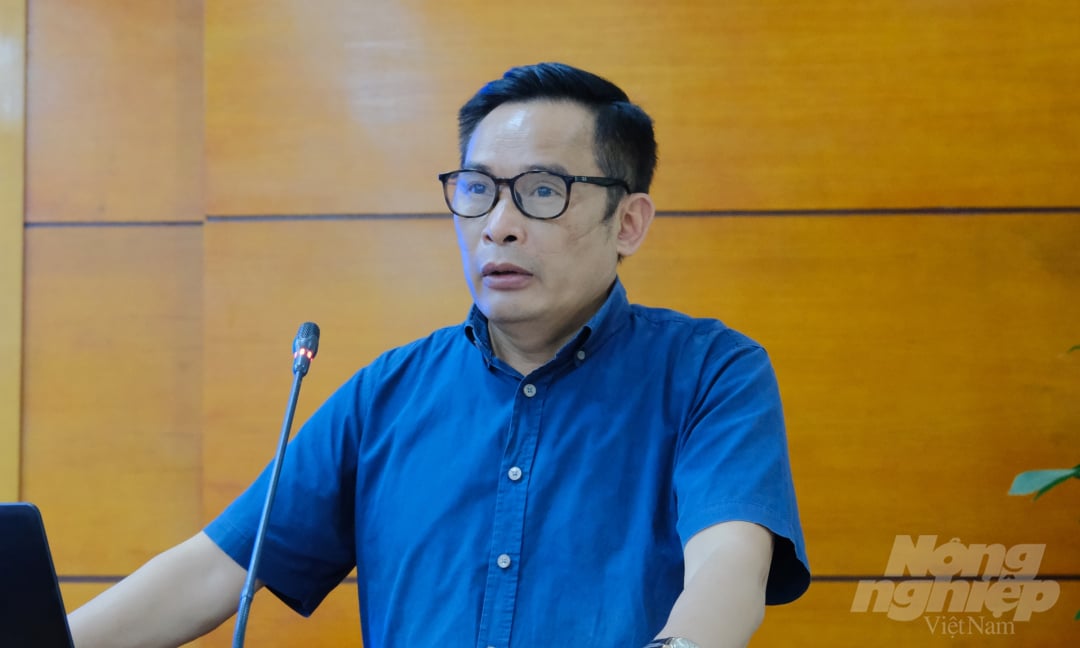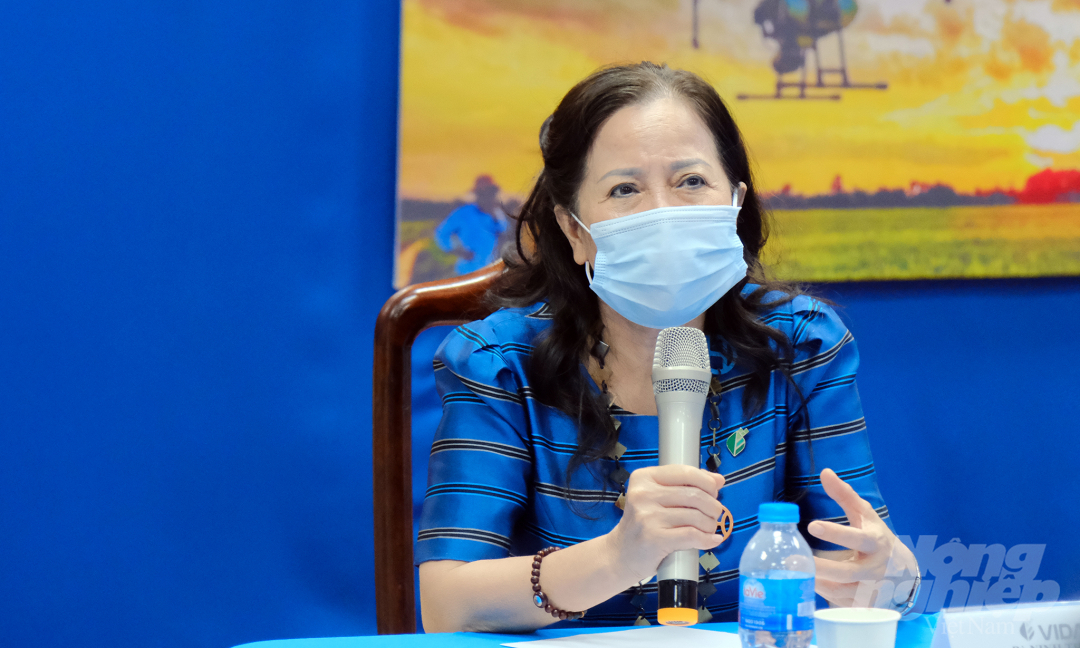November 28, 2025 | 03:46 GMT +7
November 28, 2025 | 03:46 GMT +7
Hotline: 0913.378.918
November 28, 2025 | 03:46 GMT +7
Hotline: 0913.378.918

Mr. Nguyen Nhu Cuong, Director of the Department of Crop Production, concerns about digital agriculture. Photo: Bao Thang.
"Digital transformation in agriculture is a major program, in which building a database is the most important task. However, agriculture's data is currently sparse, depending on each type of unit. Moreover, each unit will choose a different statistical method. Therefore, to synchronize all will certainly be difficult and take a long time", said Mr. Nguyen Nhu Cuong, Director of the Department of Crop Production.
According to Mr. Cuong, the Departments, General Departments, Departments, the Research Institutes, and many units of the Ministry of Agriculture and Rural Development (MARD) still take statistics of the data, but the purpose is to evaluate within the vertical sector, serving the direction and administration in a short time.
"If the data is related to a specific unit, that unit will actively unify and connect vertically. If you want legal data, you need to look it up from the General Statistics Office", expressed Director Nguyen Nhu Cuong.
In the digital transformation process, the agricultural digital map keeps an important position. People and businesses can know the location, land quality, climate, weather suitable for crop varieties, yield, etc. Therefore, this is an important database to help people and businesses develop and plan appropriate crops and livestock.
According to Decision No. 749/QD-TTG on the National Digital Transformation Program to 2025, with a vision to 2030, agriculture is one of the priorities for digital transformation.
As an organization with hundreds of members and using almost 100% of technology, the Vietnam Digital Agriculture Association (VIDA) aims to build annual reports on agricultural digital transformation, with the content providing information, knowledge about digital transformation as well as assessing the current status of the technology application process.
Difficulties are specific to each industry, group of businesses. Bottlenecks in transformation are also recognized, such as data synchronization between industries, groups of industries, or businesses.
VIDA believes that there are common problems that need to be solved to support digital transformation comprehensively, such as value chains, technology, capital, and human resources.
"The value chain issue, which is particularly relevant to farmers and is agriculture's characteristic. Technology, capital, and human resource issues require support from all sides of the digital transformation system", shared Mr. Nguyen Duc Tung, Secretary-General of VIDA.

Mrs. Ninh Thi Ty, Vice President of VIDA. Photo: Bao Thang.
VIDA recommends several measures that MARD can take immediately, including building a common and uniform database, developing infrastructure with the participation of many parties, developing policies to support capital investment for digital transformation enterprises from the state budget and investment funds, and developing an innovative and creative system, focusing on new technologies.
Solutions for building labor resources are also proposed by VIDA, such as agricultural job training based on combining the needs of enterprises and local distribution, training for farmers who are directly producing, and training high-tech agricultural labor force.
"VIDA has had links to share the businesses' needs with Vietnam Academy of Agriculture and the University of Technology, to help those universities assess the actual situation to plan a suitable roadmap.
VIDA also promotes businesses to share experiences with students, even invite students to do internships to help them have a clear view of their future careers. It is necessary for students excited in agriculture", Vice President Ninh Thi Ty of VIDA stated the solution for training high-tech human resources for agriculture.
Having the same opinion as Mrs. Ty, Mrs. Le Thi Hien, Vice Dean of the Faculty of Agricultural Technology, University of Technology, said, "To transform agriculture, it is necessary to have human resources who have both good technical skills and understanding.
The Faculty of Agricultural Technology has currently organized many tour groups for students to see real-life models to see their career outputs and realize their roles in society when they graduate. In addition, the faculty's students learn a lot about automation and information technology to move towards digital transformation in the future".
Translated by Ha Phuc
/2025/11/27/3830-1-152901_403.jpg)
(VAN) Dong Nai is developing its key crop areas, expanding planting area codes, and applying high technology to increase the value of agricultural products, aiming at a green and sustainable agriculture.

(VAN) Tay Ninh’s livestock sector is undergoing a major transformation, applying high-tech, closed-loop circular models to build sustainable value chains.
/2025/11/26/3627-4-082628_818.jpg)
(VAN) From a small café on the red basalt highlands, Le Van Hoang started a business with clean coffee, building Enjoi Coffee into a symbol of organic agriculture in the Lam Dong plateau.
/2025/11/25/0045-1-135246_13.jpg)
(VAN) Ca Mau is researching a model of sea-encroaching embankments combined with viaducts and logistics service zones, aiming both to prevent erosion and create land funds for marine economic development.

(VAN) The information was shared at the seminar 'Urban Agriculture - Solutions for Developing Green Spaces,' organized by the Kinh te & Do thi Newspaper and the Biotechnology Center of Ho Chi Minh City.
/2025/11/19/4141-2-132831_216.jpg)
(VAN) One of Japfa's outstanding solutions is implementing digital transformation and artificial intelligence (AI) to optimize operations, enhance productivity, and advance sustainable development.
/2025/11/19/4847-1-093540_448.jpg)
(VAN) The Gia Lai Provincial People’s Committee had a working session with the delegation of the U.S. Department of Agriculture, the State of Idaho, and representatives of the State's leading enterprises.